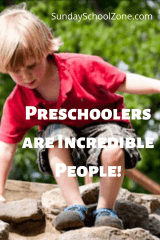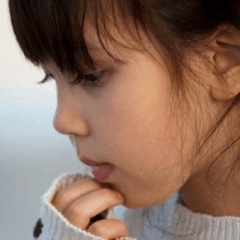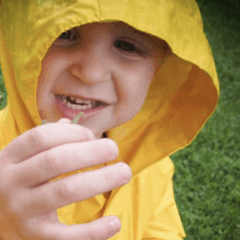Preschoolers Are Incredible People!
 Indeed! Preschoolers are special people with unique and varying developmental needs. Older preschoolers may never be at a more teachable point in their lives. This fact alone gives us a wonderful opportunity to fulfill God’s timeless command to teach His story to successive generations (Deut. 4:9). As we teach, we must consider all aspects of the child’s development, just as Jesus did for those he taught. Jesus fed the hungry, healed the sick, loved the unlovable, and sought to meet the needs of the whole person. Jesus understood that every part of a person’s life affected the other parts. So we, too, must realize that in order to help older preschoolers discover God’s love and story, we must understand and recognize the various needs in other parts of their lives.
Indeed! Preschoolers are special people with unique and varying developmental needs. Older preschoolers may never be at a more teachable point in their lives. This fact alone gives us a wonderful opportunity to fulfill God’s timeless command to teach His story to successive generations (Deut. 4:9). As we teach, we must consider all aspects of the child’s development, just as Jesus did for those he taught. Jesus fed the hungry, healed the sick, loved the unlovable, and sought to meet the needs of the whole person. Jesus understood that every part of a person’s life affected the other parts. So we, too, must realize that in order to help older preschoolers discover God’s love and story, we must understand and recognize the various needs in other parts of their lives.
God’s Developmental Design for Preschoolers
We also need to remember that the extended process of development in children is part of God’s design and plan. God designed this process for a purpose. While we may not always understand His timing, we need to trust His wisdom and work within His plan to teach and guide children in ways that match their stages of development.
What’s true for the child in the classroom needs to be true about the resources you’ll use in the classroom as well. That’s why we give special attention to creating lesson plans and activities that reflect a clear understanding of older preschoolers. The suggested plans in God’s Unfolding Story for Older Preschoolers have been developed by seasoned preschool workers and have been proven in the classroom. You can be certain they correspond to the development level of the children you’re teaching. But lesson plans can only go so far. At the end of the day, YOU as a teacher and leader of these incredible people need to understand who you are leading.
Physical
 Physically, major changes take place in a child from the time he is a young four-year-old (or older three-year-old) to the time he is almost six years old. Motor skills, the small muscles of the hands and fingers, and the large muscles of the arms and legs become stronger and more coordinated. This allows 5s to complete a variety of physical tasks more easily and with greater skill than 4s.
Physically, major changes take place in a child from the time he is a young four-year-old (or older three-year-old) to the time he is almost six years old. Motor skills, the small muscles of the hands and fingers, and the large muscles of the arms and legs become stronger and more coordinated. This allows 5s to complete a variety of physical tasks more easily and with greater skill than 4s.
• If your class includes 3s, 4s and 5s, you will need to play simple games with few rules.
• The ability to pay attention improves greatly during this time, but it’s still quite limited. While it is tempting to keep teaching when the children no longer are listening, we aren’t really teaching, because they don’t hear what we say.
• Most 4s are beginning to draw representatively, but not photo-like. For preschoolers, the process of drawing a picture is often more important than the finished product.
• The health habits of older preschoolers still facilitate the passing and sharing of germs. Therefore, we have to take added responsibility for cleaning toys and tables, providing tissues and trash containers when needed, and reminding children to wash their hands at appropriate times (after toileting, after playing outside, and before and after art activities).
• Older preschoolers are still farsighted. Consequently, close work, especially reading if print is small, can be tiring. As a result, we need to make sure that print and pictures they use are large enough for children to see easily.
• Outdoors, older 3s, 4s, and 5s love to create challenges. Always evaluate the size, challenge level, and maintenance of any playground you use with preschoolers. If you have all children on the same playground, you may need to add simpler or more complex materials to assure safety for both groups.
Mental
In many ways, older preschoolers’ thought processes are limited, yet even these limitations were designed by God to prepare them for future learning and thinking. These limitations compel us to be careful to share God’s Word with preschoolers in ways that match their level of understanding.
 • The brains of preschoolers focus on one thing at a time. For instance, when hearing the story of Noah, children may remember rain, boat, and animals, but miss Noah’s obedience and God’s provision for Noah and his family.
• The brains of preschoolers focus on one thing at a time. For instance, when hearing the story of Noah, children may remember rain, boat, and animals, but miss Noah’s obedience and God’s provision for Noah and his family.
• If you are giving two directions at once, give them in the order you want them completed. Planning and organizational skills begin to improve around age 5, but they are not yet strong. As a result, you will need to help the children think through the steps of their projects.
• Fours and 5s are trying to figure out the rules that govern their world. They are not always accurate in their efforts.
• For preschoolers, what they see is what they believe is true. If you use videos, use those that accurately teach biblical concepts.
• Preschoolers tend to remember things in terms of the exact words we use rather than the general meaning of what we say. We must be careful that the words we use are simple and concrete enough to make sense to a preschool mind.
• Each word has only one meaning in the mind of an older preschooler. When using a word with multiple meanings, use only the meaning that is most familiar to them. For new ideas, choose a different word or explain what you mean by that word.
• Vocabulary is developing rapidly in the preschool years. Children like new, big words but need help in understanding what these words mean.
• Preschoolers need multiple, repeated experiences with a new idea or concept in order for it to be remembered.
Emotional
The emotional part of the brain begins developing before the intellectual part, and emotional development is completed first. In fact, when humans encode new information, the emotion related to that experience is also encoded. As preschoolers learn about the Bible, they are learning not only what the Bible tells us, but how they feel about these stories and concepts.
• Basic emotions (joy, anger, sadness, fear, disgust, surprise), as well as self-conscious emotions (jealousy, empathy, embarrassment, pride, shame and guilt) are fairly well developed by age 4.
• Preschoolers recognize they need to control their emotions in social settings but are not always able to do this well, especially if they are tired, excited, or ill.
• Older preschoolers are beginning to recognize that different people can have different feelings than they do toward an event, although they seldom believe that perspectives other than their own are reasonable.
• While we are easily aware of the stress related to negative events in preschoolers’ lives, it is important to remember that positive events such as holidays, schedule changes for special events, or visits from grandparents may be stressful, as well.
• Shedding tears is still a common way for older preschoolers to deal with stress. In such situations, our job is to show empathy as we help children calm down after becoming excited.
• Preschoolers look to the important adults in their lives to determine appropriate ways to deal with emotions. The example we set often determines the way the children we teach will react to emotional situations.
• Common fears at this age include fears of the dark, animals, monsters, ghosts, etc. While the child’s perception of danger may be inaccurate, the feeling is real. This is best managed by recognizing the emotions and helping him or her to feel safe.
Social
 Preschoolers are beginning to develop an understanding of social rules but are limited by the fact that they assume everyone else has the same perspective they do.
Preschoolers are beginning to develop an understanding of social rules but are limited by the fact that they assume everyone else has the same perspective they do.
• Older preschoolers are not good at taking the perspective of someone else; they tend to think that if others have the same information they have, the others will think as they do.
• Preschoolers may try to manipulate others to get what they want (“I’ll be your friend if…,” “You can’t come to my birthday party unless you let me…”), and are easily manipulated by other children using the same threats or promises.
• The sense of self (their abilities and their worth) is developing in older preschoolers, but failure to compare themselves with others causes them to believe they are the best at everything they try.
• Children this age have an all-or-nothing perspective with regard to self-worth. They tend to see themselves as totally good or totally bad.
• They are now able to recognize their own characteristics and those of others (gender, race, skills and interests). We can help them see these differences deserve respect in the ways we treat children who are different from one another.
• Preschoolers develop their sense of identity based on the ways they are treated by the important adults in their lives.
• Friendship is defined in the preschool years largely in the context of the child’s circle of friends. We can help broaden a child’s perspective on friendship by helping him or her learn to play with a variety of children.
• In spite of their eagerness to play with other children, preschoolers often need help learning to negotiate disagreements.
• Fours are making a big transition in their abilities to care for themselves. As a result, they may want to be independent one minute and completely helpless the next.
• Throughout the preschool years, children are learning to balance the things they can do and decide on their own the things that require help from others.
• As is true of emotional skills, preschoolers learn social skills best by seeing them practiced by the important adults in their lives.
Spiritual
Preschoolers learn about God primarily through the interactions they have with the important adults in their lives, especially their parents.
• Preschoolers see rules as unchangeable and under the control of one who is powerful. This is good when it comes to understanding God and His instruction, but preschoolers can be legalistic in that they see all rules as being equally rigid.
• They also expect immediate punishment when rules are violated. Grace and mercy toward others is not a concept that is easy for preschoolers to understand.
• During these years, children begin to identify moral imperatives as different from social conventions. They understand, for example, that hurting someone is a worse wrong than forgetting to say, “Please” or “Thank you.”
As we are upheld and guided by the power of the Holy Spirit and develop an awareness of what we need to teach children as well as the ways children learn, God blesses us richly. We have the privilege of seeing God’s kingdom manifested, just as Jesus prayed in the Model Prayer.



